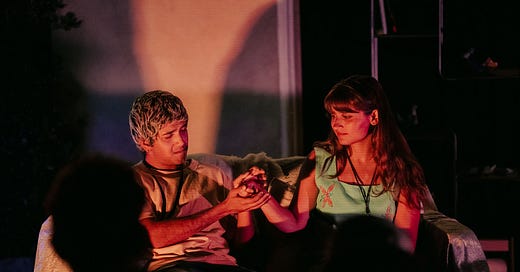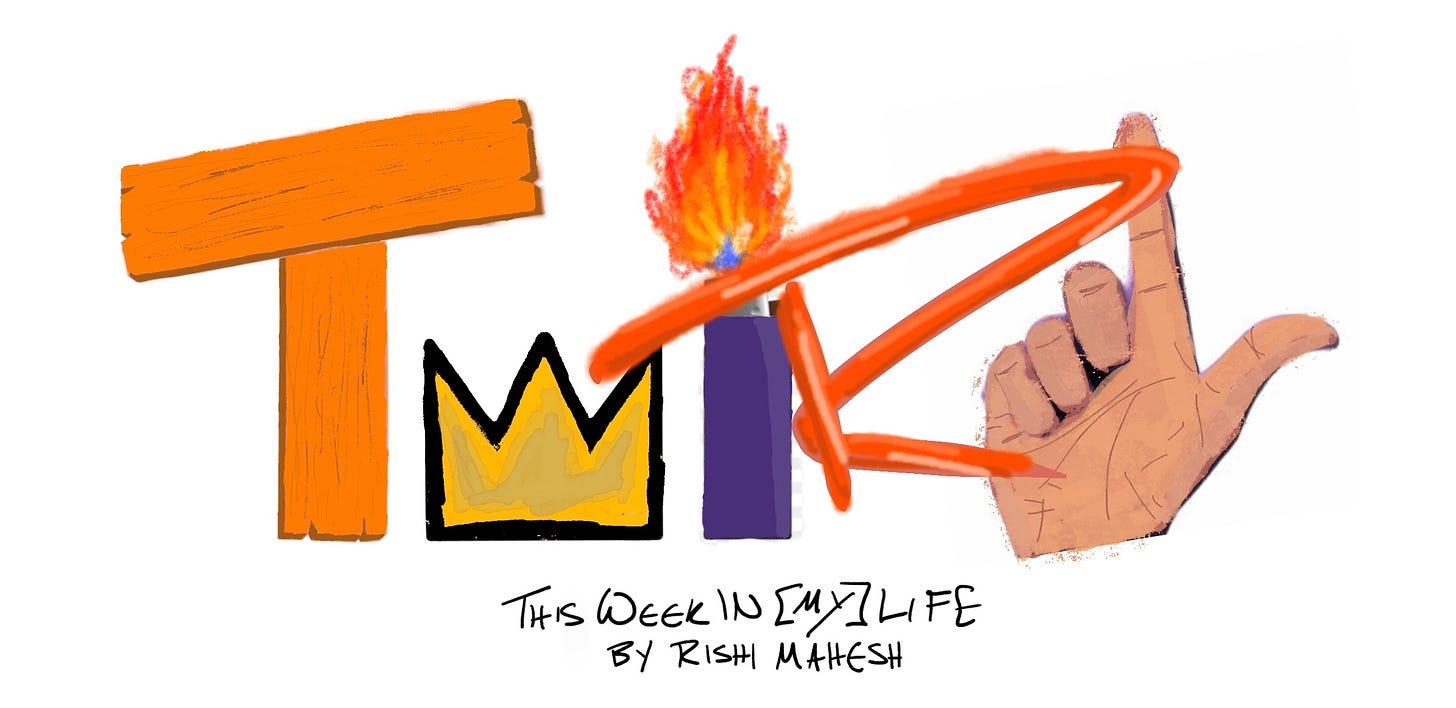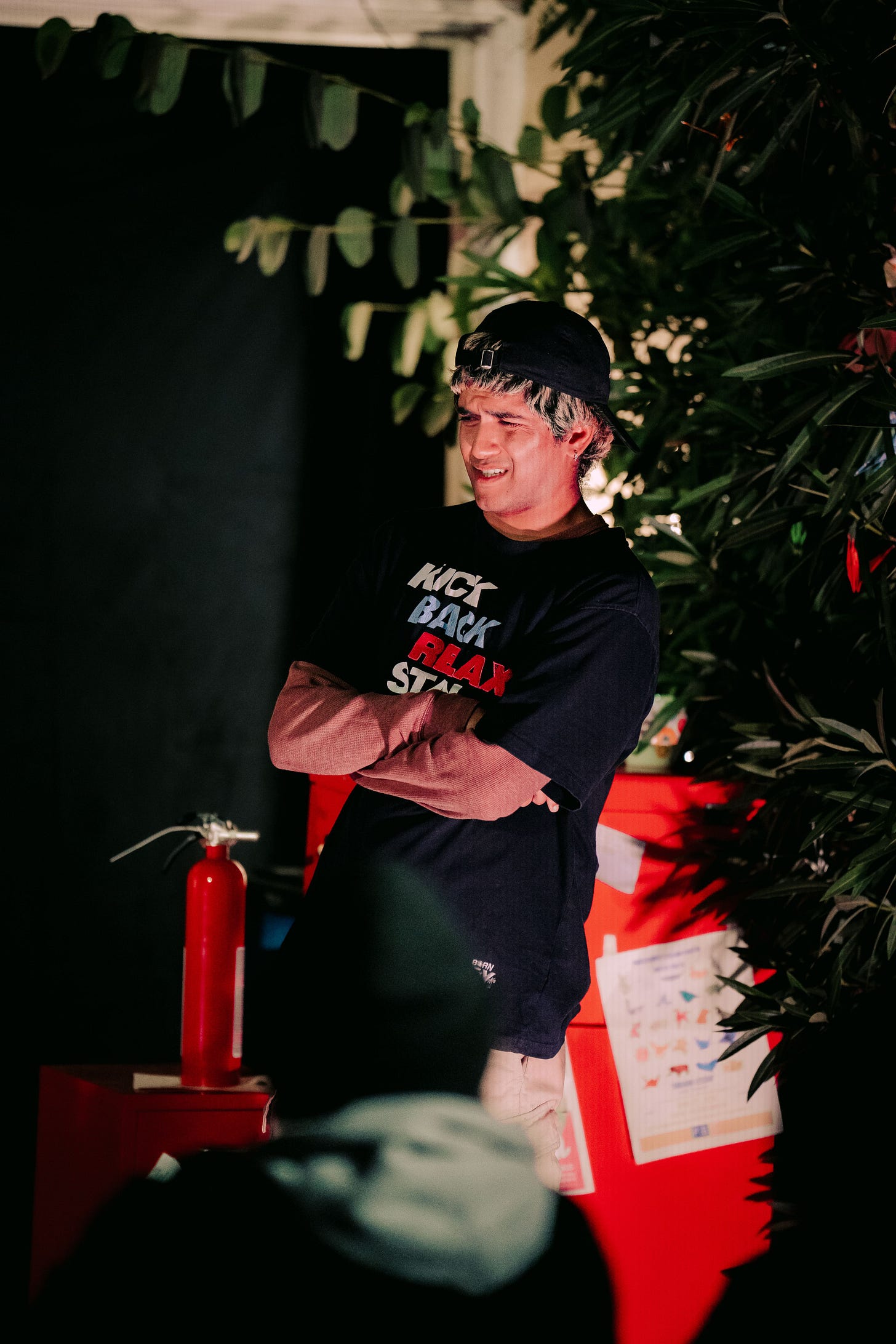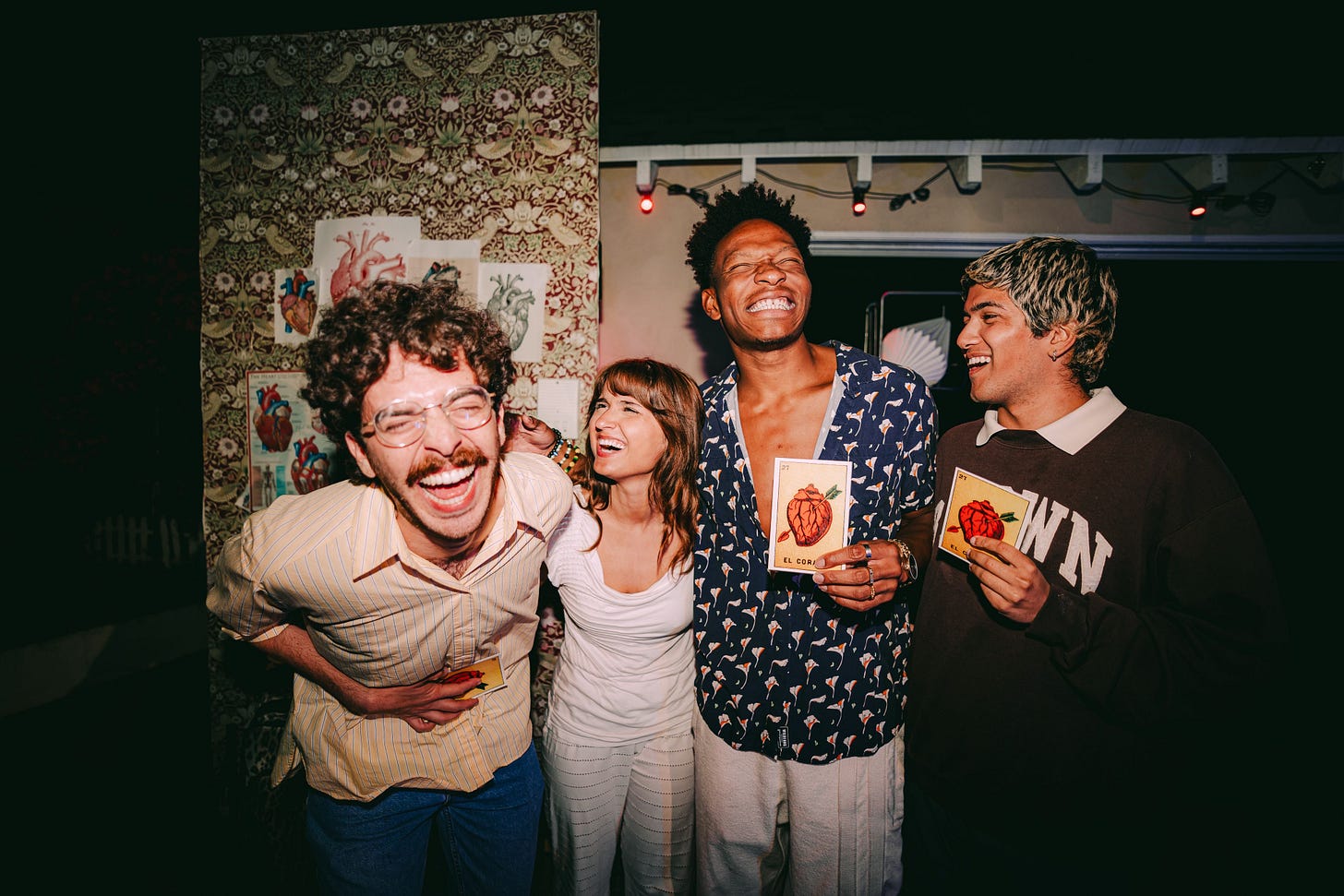Hey all- hope you guys are doing well. Today I’m writing about our production of Animals Out of Paper by Rajiv Joseph, a play that I acted in and produced that went up last weekend.
It feels weird to be over a week out from our production. The whole experience was truly a flash in a pan. The “crescendo” element of live theatre is like a magic trick: immediately after a production ends, life is suddenly more silent than it’s ever been.
I am glad that the production is over, for sure. It was a ton of work. But at the same time, as likely anyone who comes from the theatre will tell you about working in the theatre, it hardly feels like work, because of how tightly it is tied to an immense amount of love and passion.
Weaning off of the ferocious attitude that goes into putting on a play is difficult. At many points this last week, I have felt like I’d kill to be in the final stretches of another show again. Sometimes I feel like I was built specifically designed for the week before a production like this one. But in many ways, I can acknowledge that there are things about the show that I’m grateful to be moving past, particularly the character I was playing: Suresh.
I loved this kid, but he presented a lot of challenges. For starters, as designated by the play, he’s 18 years old and talks with a blaccent. He frequently throws slurs out of his mouth, at the other characters of the play. And he’s reckoning with immense trauma and existentialism across the events of the play. Along with all the work that goes into turning a backyard into a theatre and getting people to attend a play in Burbank, California, I had to work overtime just figuring out how to crack the character of this kid, Suresh.
I’m no method actor, so I wasn’t spending the end of my summer talking in his accent or walking around with the gangly gait I’d devised to play this unruly teenager, but I did feel a huge sense of responsibility to understand this fictional kid really deeply. I wanted to approach him with the utmost empathy, and be able to see the world, or at least the events of the play, clearly from his point of view. The reason why this required so much work, is because the play provides one scene that I felt was particularly challenging: Scene 6, Nagasaki (referred to as such because it takes place in Nagasaki, Japan.)
There were lots of challenges provided by this character, for this play (age, blaccent, and a section where he freestyle raps) but the reason Nagasaki felt like such a daunting scene was because its subject matter was so delicate and dramatic. Basically, in the scene, all of the characters’ complexes are put on display. He and his origami mentor, Ilana (the protagonist of the play) are in Nagasaki, Japan, for an origami conference. Suresh is studying origami under Ilana mostly because a year before the play begins, his mother passed away. Since then, he has retreated from all of his interests and communities, despite for one: his inclination towards origami.
However, being in Nagasaki for this origami conference, he is deeply negatively affected by seeing how people leave origami doves at the memorial for the nuclear bombing that destroyed the city in 1945. Mainly, about how the paper doves are a hollow gesture that fail to right the immense wrong that was done there decades prior, but also how they fail to address his personal cataclysmic event: the death of his mother.
It was a heavy scene, and every performance we had, I spent a good amount of my day stressing out on whether or not I would be able to “deliver” on the moment, when it came.
Part of this is just because I’m an amateur. I’m still learning what acting is, and what each production and character requires to feel successful and realized. There was an element to the stress of this production that came distinctly from doing a piece of live theatre. I’ve been on a lot of film sets over the last few years that required some kind of emotional lift (see: Saltwater). But on a film set, you typically only need to create that moment one time, on one day. A big part of my work on set is spent delivering a range of options, with only a few of those options ever needing to reach the fullest extent of what the moment could look like dramatically.
Especially for short films, which is the bulk of what I’ve done out here as an actor, creating a character requires a lot of imagination. A lot occurs between the lines, and before the inciting incidents. A lot of world building is generally forgone in favor of cherry-picking the most crucial excerpts that hint at the larger story. From my point of view, much of my work on a short film is spent trying to understand the character as deeply as I can, making him as relatable as possible to myself, just enough to deliver a few honest moments in his life, and then I move on after a weekend.
However, a play is a much greater commitment than a short film. I wanted to deliver not just a few honest moments in this character’s life, but fully realize his story at three different performances for an audience every night, without the ability to redo a take. The week of the show, I really wondered about my ability to “get there” on three different days, for three 90-minute performances.
And in terms of “getting there”- I don’t mean reaching for a high degree of melodrama. A big part of my internal rubric was that I didn’t want my work in the play to be manipulative. I didn’t want to force an emotional moment to prove that I can act or some shit like that- which is an honest criticism I have of some of my own work from the last few years. To some extent, delivering emotional moments on screen had begun to feel a bit like a party trick- a personal challenge to prove that I have what it takes- particularly for the imagined worlds of short films, where a team oftentimes just wants their film to pack an emotional punch. Whether or not that works in the films I’ve done, I honestly can’t be the judge of, but I knew early on that it probably wouldn’t work onstage.
Mainly because licensing a play means that you’re doing a piece which has been done many times before. The world is not so imaginary; the play gives you a lot of information about the characters in the text. At some point, on our last day of tech, I decided that I didn’t need to hit some arbitrary level of emotionally heightened performance to be successful in this role, I just needed to tell the story of this character. I had gotten to know him so well at this point, and felt so much empathy for him, that all I wanted was to do justice to this fictional kid: tell the story of what happened in his life, from his point of view. If that did end up becoming at all heart wrenching, it would have less to do with my work than that of the playwright.
So most of my work was spent just trying to make sure I understood the weight that the given circumstances of his life, offered by the play, had on his feelings and reactions to the things that were said and done to him by the other characters. This wasn’t always entirely clear to me. A few moments in his life felt somewhat out of reach when I began the process. However, during the month that we rehearsed the play, especially as the performances grew closer, many moments in my own life allowed me a clearer vantage point into the contents of Suresh’s soul. Here are some of those moments:
Our family dog, Sandy, passed away.
This play dealt with loss. That was evident from the first read. I’m no stranger to loss or grief; plenty of people I’ve known personally have passed away. Memories of those who I’ve grieved can often stir up my own emotions, but I didn’t want to bring that to this character unless it really made sense or came up naturally, out of respect to those I know who have passed, and also to my own grieving process. For the very reason that I can remember everyone I have known or loved who has passed away, is how I know that the grieving process never truly ends. Thus, I think it’s important to treat it cautiously.
Suresh isn’t the only character in the play who has lost someone. The protagonist, Ilana, is going through a divorce, and her dog recently ran away. It’s a comical amount of misfortune for her. As I mentioned earlier, Suresh’s mother passed away a year before the events of the play, and since then, he has taken on a lot of her responsibilities, such as cooking for his father and sister. He’s constantly fighting with them, as well. Suresh rarely processes his grief directly, and rarely expresses his love outright, but more often will invoke deep empathy and love when talking about animals.
Sandy, my cousin’s dog, lived a long and beautiful life, right up through the end. This past month, her medical complications began to affect her quality of life enough that a decision was made to put her down last week. Some family members even flew into Georgia to spend her last weekend with her, and they gave her a glorious sendoff.
A funny moment revealing the constant ridiculousness of life, was that on Sandy’s last day, my family got into one of those random, pointless, yet incredibly dramatic arguments that are typical of every family on Earth. A series of miscommunications in a Whatsapp group chat turned into facetime apologies from other ends of the country, and it seemed both so incongruous and also totally predictable that this random argument would become part of the tapestry of Sandy’s last hours. Because family is just like that, and oftentimes go into combat in the midst of their most vulnerable moments. Unfortunately, this incident helped me understand Suresh.
I don’t mean to cheapen or exploit Sandy’s life or death by suggesting that her passing away allowed me to “act better.” I have no gratitude for the loss of this dog- besides the gratitude that she is no longer suffering through her medical complications. But the circumstance of her death revealed to me new feelings about loss, and the unconditional love that people can express for animals oftentimes easier than they can for other humans. A minor incident of familial strife allowed me to see how Suresh’s experience could be a mirror for my own- not exactly in a perfect, logical way, but in a much more abstract sense. In the confusing, unruly way that a Rothko stirs up feelings of grief from a mere wash of colors on canvas.
Disaster strikes, and strikes, and strikes.
In the past few weeks, Israel has extended its unrelenting siege of Gaza to the mounting of attacks on Lebanon. On October 1st of this year, Iran retaliated against Israel. On that day, the inevitable reality of nuclear powers engaging in direct conflict sent shivers down my back. The sixth scene of the play, wherein Suresh reckons most deeply with his grief, takes place in Nagasaki, Japan. Ilana enters Suresh’s hotel room looking for him, after he skipped out on the day’s activities after being darkly affected by the memorial at Nagasaki.
The scene begins with Suresh remarking on the peace that he found while gazing into the koi ponds in Nagasaki. But this peaceful feeling was interrupted for him upon realizing that these fish must have been wiped out by the atomic bomb that was dropped in 1945. He wonders if it’s possible that any of them could have swam deep enough to survive.
The scene goes on to expose context from the events that took place earlier in the day, which is that Suresh had been caught in a trance at the memorial, re-folding the origami doves that people leave across the grounds into origami ravens, subconsciously representing a more fitting avian metaphor for the destruction that took place in Nagasaki. Unable to admit to this moment of vulnerability, he chastises Ilana for projecting meaning onto his creations, and states that this entire trip, especially the time spent doing origami, has been meaningless. In this moment, he finally invokes the elephant in the room, that the act of doing origami is specifically devoid of meaning in comparison to much greater concerns in his life: that merely a year ago, his mother was hit by a car.
Even just typing the first draft of this newsletter, a week after the play ended, writing that brings me to tears. The conflict he expresses is one I really relate to, and became my tether to his core. The scene was basically him asking: what is the point of making art amongst the backdrop of immense tragedy, whether it be on the scale of an atomic bomb or a car accident. It’s a question that I grapple with as well.
I wonder, of what use it has been to spend the greater part of this last year putting on plays or shooting films in the wake of the cruelest injustice being enacted on innocent people in Palestine or Lebanon? What is the point? Doing this play allowed me to process and reckon with the weight of mass destruction- but to what end? Mere days after our production ended, images of the Al-Aqsa bombing, of bodies burning alive, were similarly burned into my own memory.
Later that day, our director, Rami, wrote about the play: “I directed a play and it was about the Nakba, and it wasn’t about Palestine at all. It was a lesson in grief I needed, and a lesson in origami I’ll probably forget [...] So here’s this, because making art with these people really and truly saved me. And because the art was about Palestine, even when it wasn’t.”
I have no neat answers about the importance of making art- if it can do anything but reopen, and then re-treat, the wounds that we all carry. As I mentioned earlier, I think grieving is a never-ending process. It doesn’t end in any neat way, and I think our play reflected that reality.
One thing I can say is that we didn’t charge money for the tickets, but allowed people to make a donation if they felt compelled to. Through those donations, we made far more money than we spent producing the play. Even so, we’ve pledged to donate at least half of the money we made towards families in Gaza. That does not set my restless feelings about the frivolous nature of the arts at ease, but it is a fact that might as well be included along with the other ones.
Birds at the beach
The day before we began tech, we went to a beach in Orange county for my friend Jonathan’s annual beach day. It was gorgeous and serene, a beach chosen by true beach aficionados. I’m lucky to have friends in LA who love going to the beach. A lot of people who I meet in LA say they never go to the beach, and I’m happy to not relate. Just last night we sat on the beach at midnight after a friend’s birthday party and I saw bioluminescent algae for the first time. It was a truly mythic real life experience.
But on this early October beach day, I spent some time sitting in my beach chair, watching some ocean birds fly around the rocks. Those who sat near me made up half-imagined narratives for the birds hanging out, and it was all very precious. It helped me relate more deeply to the peace that Suresh felt while gazing into the fish pond, an oasis amongst a tumultuous inner life.
The play doesn’t neatly wrap up any of its conversations about grief or loss, which makes me feel a greater license to not try and wrap up any of my ideas on those subjects either. However, embedded into the Nagasaki scene is this monologue from the lead character, Ilana, which contains my favorite text from the piece. I think it says everything that I have to say about grief, better than I could hope to put it:
One thing I can say with certainty coming out of this play is that while I may not know how important theatre is when weighed against the great tragedies that mankind faces, I do know that I feel, deep in my bones, that theatre is a vital, essential art form necessary to human life, because of its reliance on human life. Before this past month, I would sometimes wonder how or why I chose to get a degree in what many claim (incorrectly) is a dying art form. The Theatre will never die, but more importantly, it should never die. I have a high bar for the privileges that a society should offer to its people, and my dream for every square mile of civilization is that people are not mutilated or marginalized, and are able to live lives of peace and abundance such that if they did choose to turn to the theatre- to put on a play in a backyard, or the town square, for their friends and communities, they would have the freedom to do so. To commune and imagine is a great privilege that all human beings should be able to do- and I know that everyone should have the opportunity to do so if they wish, because I have had the opportunity to do so when I have wished. Those who desire that, deserve it.
I also, and this is something I could rant about for a newsletter of its own, but I specifically think that amongst an increasingly digital, solitary world, the inherent humanity of the theatre is vitally necessary. I love film, and am absolutely addicted to my phone, but there existing an artistic medium with no screen or tangible separation between audience and performer has become even more significant and profound to me in adulthood than I ever understood when I was a student.
In a world where our existence is mined into data points, where our reality is generated by algorithms, our attention spans made brittle and ground into dust, our calendars full of overlapping events and our texts left on delivered, I think there is something so distinctly valuable about the experience of watching a human being stand in front of you and take deep breaths before speaking. In the theatre, you cannot watch on 2x speed, and there are no cuts or graphics that appear at the rate that you blink. There is no option to leave a comment and swipe to the next performer. To surrender and observe a person, living and breathing with other people, engaging in a level of nuance that more accurately reflects what it feels like to live, feels so refreshingly human.
I think it’s important in this digital age to actively seek out experiences that prioritize humanity, and I predict that because of how the theatre functions: telling stories in the most direct and human way possible, it will only become more important to me as I grow older. In that sense, I do not anticipate the death of theatre; I anticipate it becoming ever more alive.










